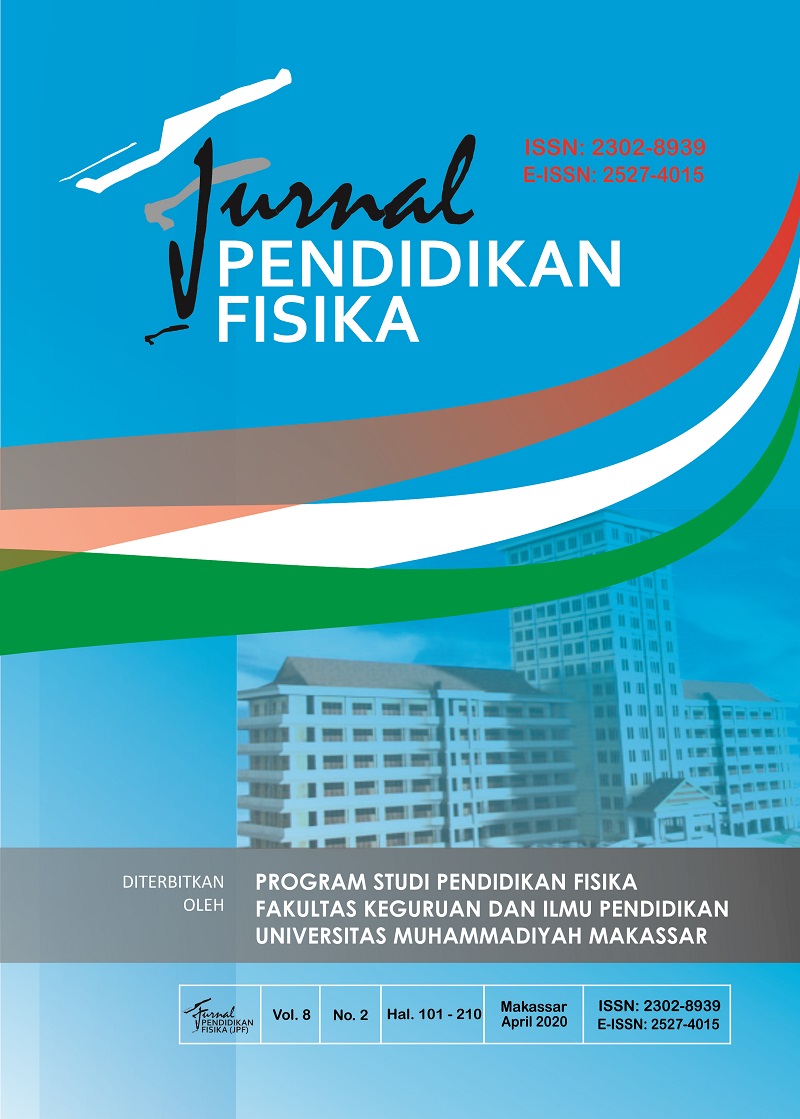Validity Analysis of the Science Learning Tools using OrDeP2E Models with Contextual Approaches to Improve Creative Thinking Skills of Junior High School Students
DOI: https://doi.org/10.26618/jpf.v8i2.3226
OrDeP2E Learning Model, Contextual Approach, Creative Thinking Skills
Abstract
The OrDeP2E learning model based on a contextual approach is a science learning activity based on a contextual approach that emphasizes the creative thinking process of junior high school students. The syntax of the OrDeP2E learning model stands for: 1) Problem definition, 2) Problem Orientation, 3) Hypothesis Submission, 4) Hypothesis Testing, and 5) Evaluation. This study aims to obtain the OrDeP2E model of natural science learning tools with a contextual approach that is appropriate for improving the creative thinking of junior high school students. This study refers to the development of the 4-D model. The results showed that the development of natural science learning tools are suitable to be applied in science learning with the following results: the syllabus got a score as many as 3,45 (valid), the implementation plan of learning got a score as many as 3,53 (valid), teaching material got a score as many as 3,50 (valid), student worksheets get a score as many as 3,63 (valid), creative thinking skills test get a score as many as 3,55 (valid).
References
Hosnan, M. (2014). Pendekatan Saintifik dan Konstektual dalam Pembelajaran Abad 21. Bogor: Ghalia Indonesia.
Panjaitan, M.,Nur & Jatmiko, B. (2016). Model Pembelajran Sains Berbasis Proses OrDeP2E untuk Meningkatkan Berpikir Kreatif dan Pemahaman Konsep Siswa SMP, Jurnal Pendidikan Indonesia, 11 (1), 8-22.DOI: 10.15294/jpfi.v1lil.3999
Arends,R.I. (2012). Learning to Teach. New York: McGrow-Hill Companies.
Mukhadis, Amat. (2013). Sosok Manusia Indonesia Unggul dan Berkarakter dalam Bidang Teknologi Sebagai Tuntutan Hidup di Era Globalisasi.(online), (http://journal.uny.ac.id/index.php/jpka/article/view/1434),diakses tanggal 11 September 2017
Munandar,S.C.Utami. ( 2012 ). Pengembangan Kreativitas Anak Berbakat. Jakarta: Rineka Cipta.
Livne, N.L, Livne, O. E., & Wight, C. A.(2008). Enhanching Sciencel Creativity Through Multiple Solutions to Open-Ended Problems Online.
[Online].Tersedia:http://www.iste.org/Content/NavigationMenu/Research/NECC_Research_Paper_Archives/NECC2008/Livne.pdf. diakses 17 maret 2018.
Prastowo, A. (2013). Pengembangan Kreatif Membuat Bahan Ajar Tematik. Yogyakarta: Diva Press.
Akbar, S. (2013). Instrumen Perangkat Pembelajaran. Bandung: Remaja Rosdakarya
Gajda, A. (2015). “The Relationship and Moderators of School Achievement and Creativity at Different Educational Stages”. Thinking Skills and Creativity. Internasional Journal of Education. Vol.2 Issue 3. Doi:10.1016/j.tsc.2015.12.004
Abdurrozak, Isrok. (2016) . Pengaruh Model Problem Based Learning Terhadap Kemampuan Berpikir Kreatif Siswa SMP. Jurnal Penah Ilmiah Vol.1. Universitas Pendidikan Indonesia.
Arjunan, R dan Jayachandran, R. (2012). “Effects of Command and Guided Discovery Teaching Styles on Retention of a Psychomotor Skill”. IOSR Journal of Humanities and Social Science (JHSS) ISSN: 2279-0837, ISBN: 2279-0845. Volume 1, Issue 6
Thiagarajan, S & D.S. Semmel. (1974). Instructional Development for Training Center of Exceptional Children. Minepolish: Indiana University.
Khanafiyah, S., Rusilowati. A. (2010). Penerapan Pendekatan Modifed Free Inquiry sebagai Upaya Meningkatkan Kreativitas Mahasiswa Calon Guru dalam Mengembangkan Jenis Eksperimen dan Pemahaman Terahadap Materi Fisika. Jurnal Berkala Fisika, Vol.13. No 2.
Aris S. Budiarso (2017). Analisis Validitas Perangkat Pembelajaran Fisika Model Inkuiri Terbimbing untuk Meningkatkan Hasil Belajar Siswa SMA pada Materi Listrik Dinamis. Jurnal Edukasi 2017, IV (2): 15-20
Filsaime, D. (2009). Menguak Rahasia Berpikir Kritis dan Kreatif. Jakarta: Prestasi Pustakarya.
Hamdiah, E, Fajar, R. (2012). Teori-Teori Pembelajaran. Yogyakarta: Pustaka Pelajar
Kemendikbud. (2016). Lampiran Permendikbud No. 22 Tentang Standar Proses Pendidikan Dasar dan Menengah. Jakarta: Kemendikbud.
Basuki, Ismet & Hariyanto. (2014). Assesment Pembelajaran. Bandung: PT. Remaja Rosda Karya.
Ibrahim,M. (2010). Dasar-Dasar Proses Belajar Mengajar. Surabaya: Unesa: Surabaya.
Downloads
Published
How to Cite
Issue
Section
License
Copyright:
Authors who publish with this journal agree to the following terms:
1. Authors retain copyright and grant the journal right of first publication with the work simultaneously licensed under a Creative Commons Attribution-ShareAlike 4.0 International License that allows others to share the work with an acknowledgement of the work's authorship and initial publication in this journal.
2. Authors are able to enter into separate, additional contractual arrangements for the non-exclusive distribution of the journal's published version of the work (e.g., post it to an institutional repository or publish it in a book), with an acknowledgement of its initial publication in this journal.
3. Authors are permitted and encouraged to post their work online (e.g., in institutional repositories or on their website) prior to and during the submission process, as it can lead to productive exchanges, as well as earlier and greater citation of published work.
Licence:
Authors are free to:
1. Share: Copy and redistribute the material in any medium or format
2. Adapt: Remix, transform, and build upon the material for any purpose, even commercially.
The licensor cannot revoke these freedoms as long as the authors follow the license terms, which include the following:
1. Attribution: You must give appropriate credit, provide a link to the license, and indicate if changes were made. You may do so in any reasonable manner, but not in any way that suggests the licensor endorses you or your use.
2. ShareAlike: If you remix, transform, or build upon the material, you must distribute your contributions under the same license as the original.
3. No additional restrictions: You may not apply legal terms or technological measures that legally restrict others from doing anything the license permits.
Jurnal Pendidikan Fisika is licensed under a Creative Commons Attribution-ShareAlike 4.0 International License.






